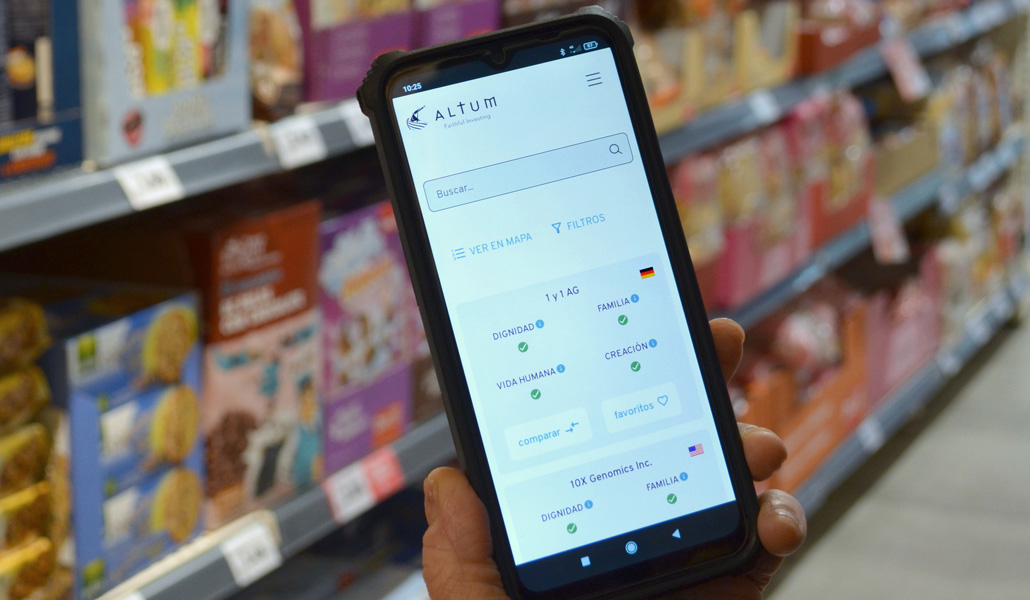*Article published in Alfa y Omega on 02/25/2022. Available at: https://bit.ly/3thAnhO
Altum Faithful Investing launches an app that analyzes the activities of over 3,500 companies and identifies which of them function in accordance with the Social Doctrine of the Church when manufacturing and marketing their products and services.
“It is possible to apply an evangelical use of money also when it comes to consuming and making our purchases, because there are differences when buying one brand over another, even if they offer the same product,” says Borja Barragán, founder of Altum Faithful Investing.
The financial advisory firm set up in 2018 has launched Altum App, the application allowing users to identify which companies carry out their activities within the framework of the Social Doctrine of the Church, and which do not.
The germ of this initiative is the Vatican document Oeconomicae et pecuniariae quaestiones, which defends the need to “select those consumer goods behind which there is an ethically worthy process”, because through our consumption “we express an ethic, taking sides in the market in favor of what helps the true well-being of all, and rejecting what harms it”.
“It occurred to us that people could have in their hands, on their own cell phones, a tool to know what to consume and what not to consume in our daily lives,” says Barragán.
Until recently, Altum has focused its activity on the management of large assets of Catholic organizations, but now offers all its information on companies to also service consumers. To this end, Altum has spent the last two years consulting and cross-referencing data on some 3,500 of the world’s leading companies, “which is equivalent to the MSCI ACWI stock market index, where 85% of the money of investment funds around the world is invested,” explains Barragán.
All this information can be consulted when, for example, a person does their weekly shopping in-store, or when engaged in even more important spending: “This way you can choose freely between one company or another, depending on whether or not it complies with any of the four fundamental pillars of the Altum Investment Guidelines, which are aligned with the Social Doctrine of the Church,” Barragán says.
The first of these four pillars on which Altum App is based is respect for the life of the unborn, as it identifies companies involved directly or indirectly in the practice of abortion, in the manufacture of abortifacients or contraceptive products, or those involved in embryonic stem cell research. It also points out those companies whose actions and practices actively attack the Catholic conception of marriage and the family, such as participating in the pornography business.
Another two pillars that the application dives into focus on identifying those companies that promote or incite religious persecution of any creed. And it recognizes those organizations involved in serious controversies due to their abuse of the environment and natural resources. As a result of his work, and without mentioning specific names, Barragán reveals a characteristic true in all markets, which is that “the larger the company, the more practices it presents in conflict with the Social Doctrine of the Church”. In view of this, Christian consumers “should ask themselves whether they want to use their money to finance a company that donates to Planned Parenthood, for example”.
More effective than boycott
However, far from encouraging divestments or boycotts of certain products as a “tool to punish” the companies that manufacture them, Barragán sees it as “more useful” to contact the companies “to make them see the relevance that the defense of life, religious freedom and creation has for their clients”. Barragán has reached this conclusion after having contacted 600 companies over the past three years. During this time, the founder of Altum Faithful Investing has met “many managers who are completely unaware of the destination of the investments of the companies in which they work”.
In personal dealings, “we have been able to offer them an ethical alternative and we have seen that many companies are taking very good steps. Changing inertia in this area is very simple, and is more effective in the long term than simply stopping buying this or that brand,” he says.
Although Altum currently works with institutions with a Catholic sensibility – congregations, seminaries, bishops’ conferences, foundations and families with strong convictions – the impact of its work has already reached the Protestant world.
“We have been contacted from the United States by evangelical movements with whom we agree in terms of investment criteria,” he says, but his aim is to go further and make his activity interesting even to non-believers, “because who would be interested in financing abortion or the culture of death? What company or individual would not prefer to invest in companies that are in favor of life and creation?”




